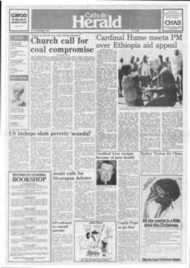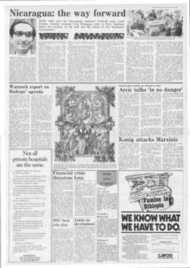Page 5, 16th November 1984
Page 5

Report an error
Noticed an error on this page?If you've noticed an error in this article please click here to report it.
Tags
Share
Related articles
Option For The Poor In The
Word Of Life "take Heart, It Is Have No Fear (matthew 14,27)
How The Church Grows With The Blood Of Its Martyrs
Are Not Those Who Object To The "church Putting The
Philip Pullman’s Curious Life Of Christ
Tragedy of man's inhumanity to God
"In so far as you did this to one of the least of these brothers of mine, you did it to me" (Mt. 25,40).
THESE WORDS of Jesus are set like a pearl in the well known page of Matthews Gospel where the Last Judgement is described. It is a page which in summary form presents us with all the message of the Gospel and puts its seal on everything the Gospel states about man and all the Gospel demands from man.
Jesus who has been awaited by all nations has come and has saved mankind in the shipwreck of sin, by suffering in himself the price of so great a purification_ It is he who will come again, with his rightful title as the KingJudge, at the end of time and who will gather all men of every place and age, in order to give to each man what he deserves according to his works — eternal reward or eternal punishment.
However according to the description of the Last Judgement given by Jesus to his disciples, the divine judge will say something which will surprise everybody: 'I was hungry and you gave me food'. When did all of us give him food? Therefore he goes on to explain:
"I tell you solemnly, in so far as you did this to one of the least of these brothers of mine, you did it to me".
According to this description, only at the Last Judgement will we learn that each person was Christ's brother, and therefore that each act of love was carried out or denied to Christ.
Jesus, however, in his infinite love for man, has not kept this great and tremendous truth hidden until the end of time. Rather, so that it would stand out in all its importance and value, he revealed it in the setting of the event from which we cannot turn back.
"In so far as you did this to one of the least of these brothers of mine, you did it to me".
Who are the people that Jesus calls 'the least of these brothers of mine'? The context in which Jesus uses this expression is universal; as we have seen, it is a judgement where all men without distinction are called together.
His words 'the Least of these brothers' does not just mean Christians, but it means any man, whether Christian or not who is in need or in difficulty.
The text mentions those who are hungry or thirsty, those who need clothes or shelter, those who are sick or who are in prison, but it is not difficult to extend the list to the millions of the poor and the suffering, who implore our help in the world today both in words and in silence.
These are the people Jesus calls his brothers and he is mysteriously bound in solidarity with them. Already in the Old Testament God declares himself to be on the side of the poor in a special way, but it is never stated that he • identifies himself with the poor. This does happen with Jesus, "God with us", as he himself states: "In so far as you did this to one of the least of these brothers of mine, you did it to me" The identification of Christ with the poor is one of the greatest and most innovatory aspects of the gospel message. In becoming flesh, the Son of God, "was rich, but he became poor" (2 Cor. 8,9).
Christ came to serve not to be served, he cured the sick and gave relief to those who were suffering, he mixed with those on the margins of society, not on account of some moral or spiritual quality of theirs, but out of love.
His charity was open to all without any distinction, but he had a special love for those in most urgent need, and he lives this out right to its utmost expression in his death on the Cross for all of us sinners who are in need of his forgiveness.
Christ has remained faithful to this line also after the resurrection: he is indeed present in a special way in whoever is suffering, in whoever is in need. At the end of the world, Christ will use as his criterion for judgement on all men and the way they have behaved towards the poor and the humble, those who he considers are "his brothers".
Each action of ours towards our neighbour is directed at Christ and has the value of eternity.
"In .so far as you did this to one of the least of these brothers of mine, you did it to me".
This word confirms for us once again that for Jesus charity is the most important thing; charity is indeed the essence of the Gospel.
It is Clear therefore how we should put this Word of Life into practice.
Let's begin at once to recognise Jesus in whoever passes next to us, and let's treat every neighbour as we would really treat Jesus, beyond any discrimination between rich and poor, educated or ignorant, likeable or dislikeable, old or young, beautiful or ugly.
Whatever our position is in society let's not miss the many opportunities we have to show our love with actions, above all directed towards those in greatest need: the starving, the homeless, the sick, the unemployed, those on the margins of society, drug addicts — all those whom we learn about day by day in our cities and in countries far away.
Whenever we forget to live like this let's start afresh at once. We will never be without a neighbour to love.
Chiara Lubich
blog comments powered by Disqus











